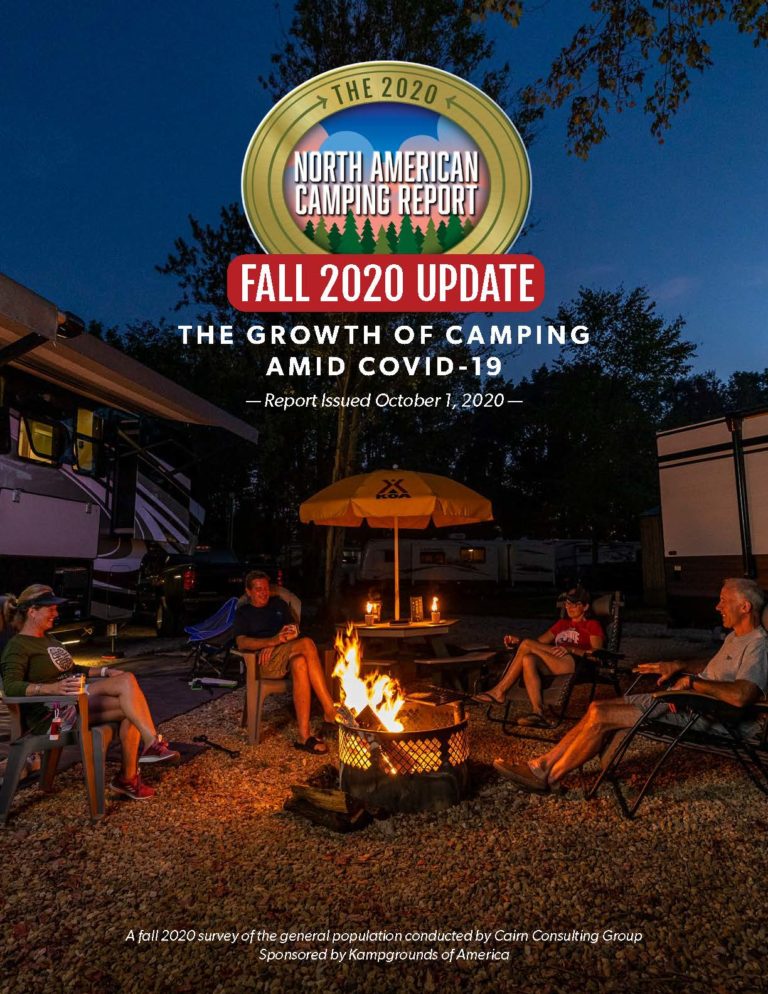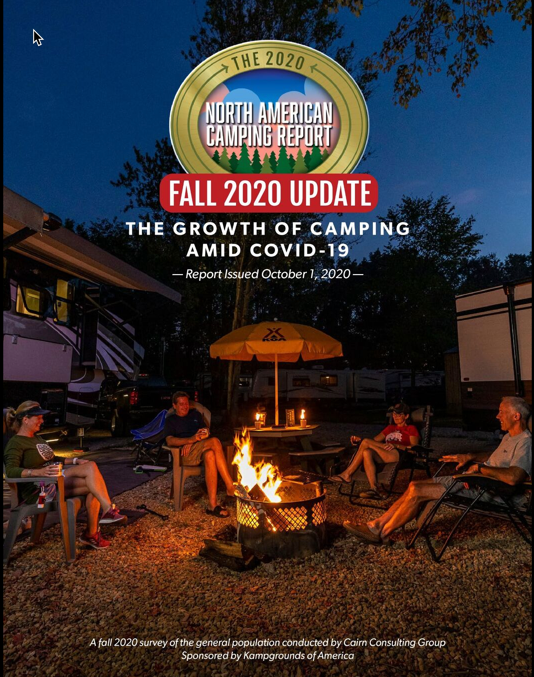 Fall COVID-19 Edition of the North American Camping Report
Fall COVID-19 Edition of the North American Camping Report
Shows Strong Camping Sector Growth Among a Tough Year for Travel
Leisure travelers predicted in May that their first trip once COVID-19 travel restrictions were lifted would be a camping trip, and the results of the fall special edition of Kampgrounds of America’s annual North American Camping Report suggest that those predictions exceeded travelers’ intended level of participation. The “Growth of Camping Amid COVID-19: A Fall 2020 Update” shows that 21% of leisure travelers took a camping trip this summer once restrictions were lifted. One-fourth of North American campers indicate that their first camping experience occurred since the start of the pandemic, and 42% say that they will still take planned camping trips during the remainder of this year.
The fall COVID-19 follow up to the North American Camping Report surveyed general leisure travelers September 4-9, 2020 to understand if behavior and sentiment toward camping had changed from initial reporting conducted in May 2020. Not only has camping activity increased, but camping is still considered the safest type of travel, according to more than half of leisure travelers (56%), which is a 10-percentage point increase from May results.
“While it’s great to see a strong rebound of camping and the effect that has on the broader outdoor hospitality industry, it’s this summer’s high level of interest among new campers and the re-engagement of past campers that really excites me,” said Toby O’Rourke, President and CEO of KOA. “Of the new campers that joined the fold in 2020, many have indicated they will continue camping in the future, which really drives home that camping and time spent in the outdoors can have such a positive impact on peoples lives, pandemic or not.”
When North Americans make the personal decision to resume their travels, 29% of leisure travelers –almost half (45%) of campers and even 15% of non-campers (leisure travelers who indicate they do not camp) – plan to replace a cancelled or postponed trip with camping. Prior to the pandemic, camping accounted for 11% of all leisure travel trips, while post-COVID-19, camping could account for 15% of planned trips through the remainder of 2020.
Additional key findings of the “Growth of Camping Amid COVID-19: A Fall 2020 Update” include:
Camping Activity This Summer
- Nearly half of all campers indicated either starting camping for the first time or restarting after having not camped in recent years.
- Millennial travelers represent the highest interest in camping since the start of the pandemic; 19% of Millennial travelers went camping for the first time since the start of the pandemic representing the highest proportion of new campers.
- One-in-5 Canadian campers say that they have taken their first camping trip ever since the start of the pandemic, and another 1-in-5 say that they have started camping again after not having camped in recent years.
- Since the pandemic began, 46% of leisure travelers have indicated spending more time outdoors – 57% of campers and 36% of non-campers.
- Prior to the pandemic, camping accounted for 11% of all leisure travelers’ trips; post-COVID-19, camping could account for 15% of these travelers’ planned trips through the remainder of 2020.
New, First-Time Campers
- New and re-engaged campers represent a much younger demographic, primarily Millennials who comprise 40% of all campers and 55% of new campers who have indicated taking their first camping trip since the start of the pandemic.
- Camping continues to be a family activity with 82% of first-time campers – and 70% of campers who have restarted camping this year – indicating they have children in the household.
- Most new campers (53%) have indicated they are currently working from home.
- Those new campers this year are significantly more likely than non-campers to have taken more vacation days since the start of the pandemic – 53% of these new campers have taken more vacation days in comparison to previous years.
Camping Amid COVID-19 Concerns
- Across the board – campers and non-campers alike – rank camping as the safest type of travel. When asked to compare camping to other forms of travel, 56% of leisure travelers, 63% of campers, and 49% of prospective campers feel camping is a safer travel alternative.
- This summer, approximately 80% of campers have either planned trips close to home or took trips that were closer to home.
- Private bathrooms while camping are important to 48% of all leisure travelers, including 42% of campers and 58% of prospective campers.
- More than half of general leisure travelers (60%) are willing to travel to less popular locations in order to avoid overcrowded areas. This sentiment is echoed by 68% of campers.
- Regarding the importance of getting kids outdoors, 49% leisure travelers, and 63% of campers, think it’s more important than ever for kids to get outdoors. Even those who do not self-identify as campers have increased this belief since the May survey (36% of non-campers, +12 percentage).
The Popularity of RVing
- More than half of all campers (51%) say that they are now more likely to purchase an RV, which has stayed consistent to interest levels seen this past May.
- Of these campers, Gen Xers (62%) are the most inclined to consider purchasing an RV.
- Among prospective RV campers, 34% would buy an RV to go on a camping trip while 32% would plan to rent one.
- Of these potential RV renters, 29% would do so from traditional rental company and 32% from a peer-to-peer service.
- The primary driver of an RV purchase is concern over cleanliness of accommodations at hotels or resorts.
- Further, interest in full-time RVing is highest among millennial campers (36%).
Remote Work and School Settings to Increase Camping Through 2020
- More than half of campers (56%) say that the ability to work from home during the pandemic is allowing them to camp more often (and work simultaneously) through the remainder of 2020.
- The impact of being able to “work at home” on potential camping trips is most pronounced among Gen Xer (45%) and Millennial (40%) campers.
- The closing of the Canadian border during the pandemic has shown to impact the travel plans among American travelers more than Canadians. Twenty-eight percent of American travelers indicate the closing of the border as having a great deal of impact to their travel plans this coming winter, compared to 23% of Canadians.
- About 28% of campers suggest that they are now more likely to be snowbirds, compared to 10% of prospective campers. Interestingly enough, it is Gen X campers and non-campers who are most likely to consider snow-birding.
- For campers who have not yet gone camping in 2020, but would like to, hearing from a “trusted expert” that it is safe to do so is the assurance most needed to camp (27%). An equal 16% of campers and prospective campers alike are waiting for the availability of a vaccine to feel comfortable camping.
Camping Forecast for 2021
- It is estimated that 18% of the new campers in 2020 will continue camping in the future.
- Of these new campers, 44% of both RV and tent new campers and 40% of new glampers indicated they are likely to continue camping into 2021.
- Once state or local government restrictions are lifted, the primary barrier for both campers and prospective campers to camping (or camping more often) is most closely tied to the restrictions due to COVID.
- For campers, work status (28%) and financial implications (26%) are also important considerations; close to half of mature campers (45%) cite health issues.
- Among new campers who are likely to continue camping, the most commonly listed reason for continuing is that it’s relaxing.

